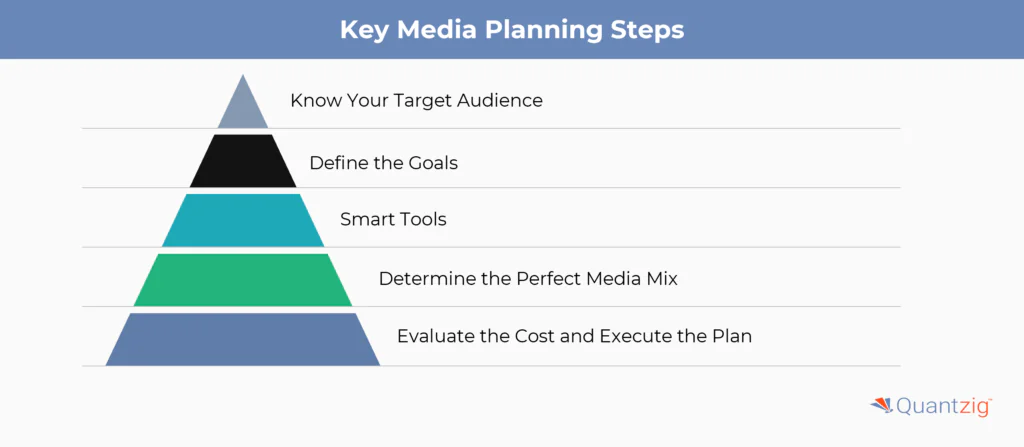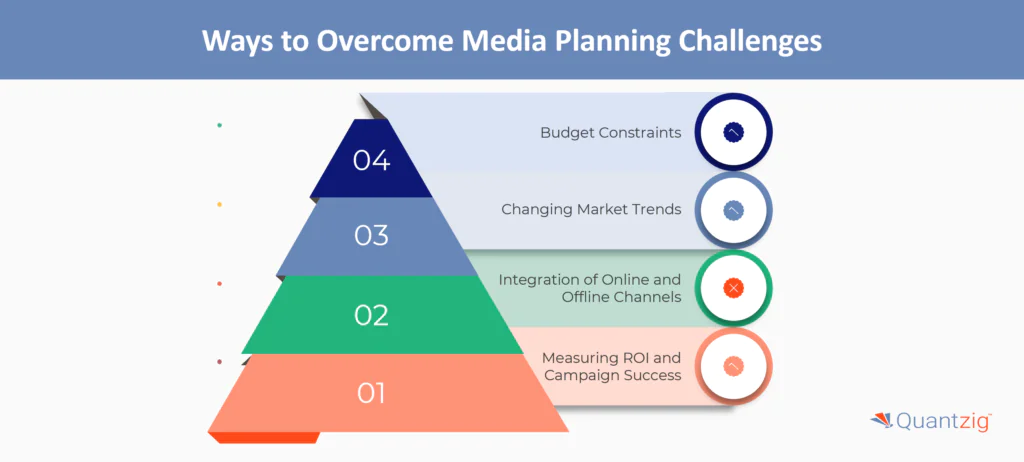Author: Associate Vice President, Analytics and Data Strategy, Quantzig.
Media companies trying to develop good ad campaigns for a large target audience and at lower prices have the benefit of the web as a useful marketing tool. However, creating a compelling media plan is a hard nut to crack. Marketers and advertisers often make a common mistake while creating campaigns and planning: They tend to focus heavily on the budget and neglect the media plan. For the campaigns to become successful and the messages to make the right impact, advertising companies must give much thought to the markets that they serve in and the channels that they choose for delivery. If you are facing trouble in determining planning effectiveness, worry no more. In this article, we unravel the steps of media planning that media companies can follow to create the perfect plan.
Book a demo to experience the meaningful insights we derive from data through our analytical tools and platform capabilities. Schedule a demo today!
Request a Free DemoTable of Contents
What is Media Plan?

Media planning is the strategic process of determining the most effective way to deliver advertising messages to a target audience. It involves analyzing audience demographics, selecting the optimal media channels and placements, and allocating the advertising budget to maximize reach and impact. The goal of media planning is to create a cohesive, data-driven strategy that aligns advertising efforts with broader marketing objectives to drive business results.
Why is the Importance of Media Planning?
A media plan guides the strategic process of determining the best way to deliver advertising messages to a target audience, helping to maximize the reach, impact, and return on investment of marketing campaigns. By outlining the target audience, selecting the optimal media channels, allocating the advertising budget, and scheduling the content distribution, a well-crafted media plan enables businesses to communicate with their customers more effectively and efficiently.
Understanding the Main Types of Media
The media landscape has evolved significantly over the years, encompassing various channels that cater to different audiences and advertising objectives. Businesses now have access to both traditional and emerging media options, as well as digital platforms that offer enhanced targeting capabilities. Below is a breakdown of the main types of media categorized into Traditional, Digital, and Emerging Media.
| Media Type | Description | Examples |
|---|---|---|
| Traditional Media | Channels that have been widely used for decades and offer broad audience reach. | Print: Newspapers, Magazines Broadcast: TV, Radio Out-of-Home: Billboards, Posters, Signage |
| Digital Media | Online platforms and formats that offer targeted, measurable advertising. | Social Media: Facebook, Instagram, Twitter, LinkedIn Search: Organic, Paid Display Advertising Video: YouTube, Connected TV Audio: Podcasts, Streaming Music Mobile: In-App Advertising, SMS/MMS |
| Emerging Media | Newer, innovative channels leveraging technology for immersive or targeted experiences. | Augmented Reality (AR) Virtual Reality (VR) Influencer Marketing Programmatic Advertising Internet of Things (IoT) |
This classification helps marketers choose the right media mix based on their target audience and campaign goals, whether through broad-reaching traditional channels or highly targeted digital and emerging media formats.
Media Planning vs. Media Buying
| Aspect | Media Planning | Media Buying |
|---|---|---|
| Focus | – Research and analysis – Strategy development – Channel selection – Budget allocation | – Negotiation – Procurement – Campaign management – Ad placement execution |
| Key Tasks | – Conduct market research – Define target audience – Develop media strategy – Choose media channels – Allocate budget | – Negotiate ad placements – Purchase ad space – Manage relationships with media outlets – Execute campaign – Monitor performance |
| Outcome | A comprehensive media plan that outlines the most effective approach to reach the target audience | Your message reaching the target audience through strategic ad placements across chosen media channels |
In summary, media planning sets the strategic direction, while media buying brings the plan to life through the tactical execution of ad placements. The two functions are complementary and equally important in driving the success of a marketing campaign.
Effective Media Planning Strategies for Success
Successful media planning requires clear goals, a strong understanding of the target audience, and the right tools. Below are key strategies for optimizing media planning, with Quantzig’s services providing expert guidance at each step.
| Step | Description |
|---|---|
| Know Your Target Audience | Understanding the target audience’s demographics is crucial for reaching them effectively. Create audience personas to guide where they consume media—TV, radio, online. |
| Define the Goals | Set clear goals from the start to measure campaign success. Compare performance against these standards to identify areas for improvement. |
| Leverage Smart Tools | Use smart media planning tools to organize, track, and measure ad spend and campaign effectiveness. Quantzig offers advanced tools and analytics for streamlined execution. |
| Determine the Perfect Media Mix | Choose the best media channels based on audience preferences. A mix of online and offline channels ensures a well-rounded approach. Quantzig helps tailor the right media mix. |
| Evaluate Costs & Execute the Plan | Evaluate costs against the budget without compromising on effectiveness. Quantzig’s cost-optimization solutions ensure campaigns are both impactful and cost-efficient. |
Quantzig’s comprehensive media planning services empower businesses to execute data-driven strategies for optimal ROI.
Experience the advantages firsthand by testing a customized complimentary pilot designed to address your specific requirements. Pilot studies are non-committal in nature.
Request a Free PilotHow to Analyze a Media Planning Process?
To analyze a media planning process, consider the following factors:
- Audience Targeting: Evaluate how well the plan identifies and reaches the target audience.
- Media Mix: Assess the balance and integration of different media channels used.
- Reach and Frequency: Examine the plan’s ability to achieve the desired level of audience exposure.
- Budget Allocation: Review the distribution of the advertising budget across media channels.
- Timing and Scheduling: Evaluate the timing and scheduling of ad placements for maximum impact.
- Creative Execution: Assess the quality and consistency of the creative assets used across channels.
- Performance Metrics: Analyze the key performance indicators (KPIs) used to measure the plan’s effectiveness.
- Flexibility and Adaptability: Determine the plan’s ability to adjust to changing market conditions or campaign goals.
By thoroughly analyzing these components, you can assess the overall effectiveness of the media plan and identify areas for improvement or optimization.
How Quantzig Helps in Overcoming Common Media Planning Challenges?
Media planning is a critical aspect of marketing that requires strategic allocation of resources, adaptation to changing trends, and the ability to integrate various channels effectively. Below are some of the key challenges in media planning and how they can be addressed:
| Challenge | Description | Solution |
|---|---|---|
| Budget Constraints | Working within limited budgets while ensuring maximum impact across multiple channels can be difficult. | A detailed department budget and a comprehensive view of campaigns enable strategic resource allocation. |
| Changing Market Trends | Staying updated with rapidly evolving market trends is essential to keep campaigns relevant and competitive. | Regular market research and trend analysis allow planners to make informed decisions and adjust strategies as needed. |
| Integration of Online and Offline Channels | Balancing the strengths and benefits of both online and offline channels can be challenging. | An integrated approach, considering target audience and campaign objectives, ensures the right balance between online and offline efforts. |
| Measuring ROI and Campaign Success | Accurately assessing ROI and campaign success across various metrics like traffic, revenue, and brand awareness can be complex. | Implementing project evaluation strategies and analyzing key data points help marketers measure success and make data-driven decisions for future campaigns. |
How does Quantzig Help with Media Planning Services?
| Service | Description |
|---|---|
| Digital Marketing Optimization | – Identify the most effective digital media channels for reaching the target audience – Leverage advanced analytics to understand audience preferences and behaviors |
| Target Audience Analysis | – Analyze key characteristics and behaviors of the target audience – Ensure the media plan is aligned with audience preferences |
| Media Channel Evaluation | – Evaluate a mix of paid and earned media channels – Determine the optimal media mix to reach the target audience |
| Media Plan Development | – Create a comprehensive media plan with marketing strategy resource allocation – Devise a detailed scheduling strategy for media placements |
| Paid Media Management | – Manage paid media campaigns across online and offline channels – Ensure ads are strategically placed to achieve maximum visibility |
| Competitive Research | – Conduct thorough analysis of competitors’ media strategies – Refine the media plan to gain a competitive edge |
| Omnichannel Media Planning | – Integrate a seamless, omnichannel approach across all media channels – Enhance customer experience and increase marketing effectiveness |
| Media Planners and Buyers | – Leverage the expertise of experienced media planners and buyers – Ensure cost-effective media placements and execution of the media plan |
Quantzig’s comprehensive media planning services help businesses create and implement effective, data-driven media strategies that drive engagement, optimize resource allocation, and achieve marketing objectives.
Get started with your complimentary trial today and delve into our platform without any obligations. Explore our wide range of customized, consumption driven analytical solutions services built across the analytical maturity levels.
Start your Free TrialConclusion
The benefits of creating a robust media planning strategy extend beyond the execution of a single campaign. It lays the foundation for long-term success by ensuring strategic content creation, optimized platform utilization, team empowerment, effective advertising, and measurable goals. As businesses navigate the ever-evolving landscape of media channels, an efficient approach becomes indispensable for achieving and exceeding marketing objectives.





